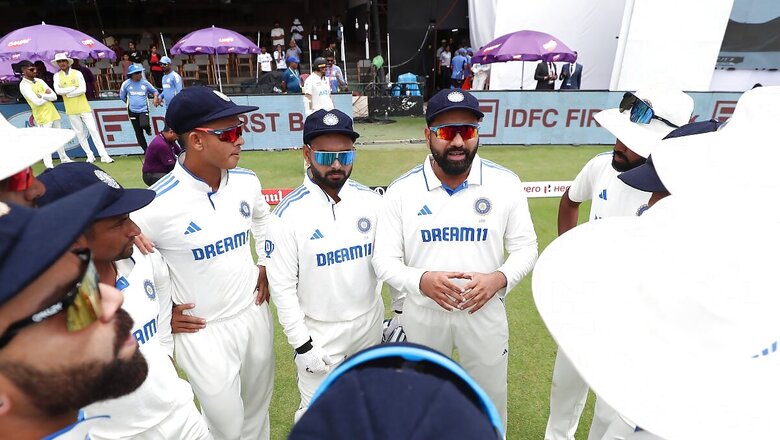
views
Team India had to endure one of the toughest days in its vast history of the sport on Thursday as Rohit Sharma and Co. were folded for a score of 46 runs on the second day of the opening Test against visitors New Zealand. As many as five batters went back to the hut without getting off the mark as Kiwi bowlers Matt Henry and Will O’Rourke ran riot at the M Chinnaswamy Stadium in Bengaluru.
Most of the blame for the shambolic showing fell on the shoulders of skipper Rohit, who agreed to have made the incorrect call after the toss of the coin swung in the hosts’ favour.
Rohit’s decision to bat first in the damp conditions of Bengaluru, after the first day was rained out, might have been influenced by the team selection as the hosts opted to start with three spinners. And the fact that New Zealand are acclimatised, and have the bowling attack suited for such pitches played further into the hands of the touring side.
At the presser after the end of the day’s play, Rohit said it hurt to see the dismal scorecard and didn’t hesitate in admitting he made a grave error in his judgement of the pitch. What is noteworthy was the manner in which the captain handled the question thrown at his following one of the side’s most pathetic displays with the willow in Test whites.
Rohit broke the silence in the room as he uttered: ‘Chalao Talwar (Bring the knives out!).
Banter to break the air of tension that had engulfed the conference tribune at the Chinnaswamy.
He owned up to the lapse in judgement that had condemned the side to their third-lowest score across all time and their lowest on home soil.
Despite the calamitous situation the hosts find themselves in what was admirable was to witness the leader of the pack shouldering the blame with such candour.
The skipper discussed a variety of other issues but what stood out was the willingness of the 37-year-old to stand up and face the queries head-on. The ability to accept merited criticism has proved to be the cornerstone of sides which have dominated the sport through the ages and have left a watermark for sides that followed to emulate.
Rohit has been cherished as the ‘guy-next-door’ who oozes quality with the willow and his leadership skillset has nothing but bulged ever since he took the hottest seat in the world of cricket, at the helm of the Indian cricket team.
With time, the carefree batter has come to evolve into a charismatic leader who does not shy away from a challenger on the field or off it. His nature to ‘call a spade, a spade’ embodies a side that is poised in the right direction.
It is very reminiscent of the dominant Australian side that ruled the world of cricket in its prolonged heyday with astute leaders such as Steve Waugh and Ricky Ponting who followed.
Now it wouldn’t be just to draw parallels between the Indian captain and the like of Ponting citing how starkly contrasting their natural personas are. It would be a fairer call to search for similarities between the menacing pull the legendary batters boast in their respective arsenal, however, even that would fall short of the tag of a proper like-for-like comparison.
Ponting stood out for his ability to take the brunt of the blame shielding his side from unwanted external factors that could have an effect on his side.
What is also noteworthy is the fact that skippers such as Ponting himself did not have to contend with allegations or accusations over a lack of quality in performance or output simply due to the fact that they only found themselves in compromising situations a negligible number of times.
However, one can’t rule out the element of uncertainty. Certainly not in sports.
But what sets the top skippers and teams apart is their ability to shoulder due criticism and respond to the same with their demonstrations on the field.
The most crucial lessons are imbibed through experience and there is no substitute for the personal ordeals. And the leader is no stranger to the highs and lows that the sport of cricket can throw at you.
Rohit’s image of being a ‘no-nonsense’ orator and his inclination to take on challenges head-on in lieu of beating around the bush, on and off the field, has earned him plaudits and admirers aplenty and the nation stands firmly behind the man who ended a prolonged ICC trophy-drought.
When a leader doubles up as the side’s guardian, though not susceptible to mistakes, he also fosters an environment for the players under him to cherish and thrive.
The ‘Hitman’, as he is fondly known, has come to be seen as an older brother of sorts to the fledglings under his wings, who resonate with the skipper’s sentiments.
And if that isn’t what a captain brings to the table after the umpire has tipped off the bails, well, I guess we shall keep looking for the right response.




















Comments
0 comment